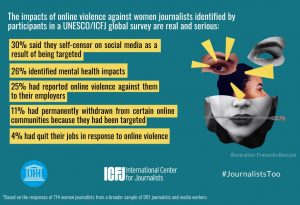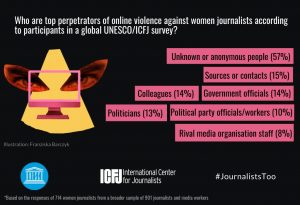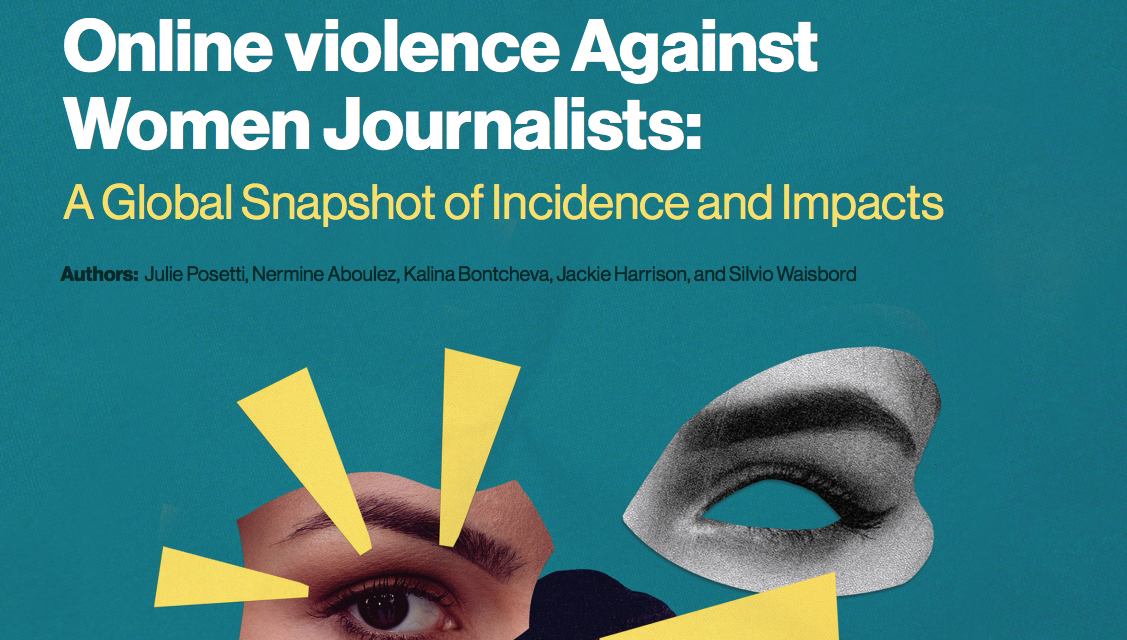On 10 December, 2020 the first substantial findings from a global survey about online violence against women journalists conducted by UNESCO and the International Center for Journalists (ICFJ) in collaboration with the Centre for Freedom of the Media was published.
The report was authored by Julie Posetti [1], Nermine Aboulez, Kalina Bontcheva [2], Jackie Harrison [3] and Silvio Waisbord.
Over 900 validated participants from 125 countries completed the survey in Arabic, English, French, Portuguese and Spanish. The findings in the report reflect the input of the 714 respondents identifying as women.
The report highlights key findings at the global level to guide action designed to improve responses to online violence. Thirteen infographics and 31 key findings are shared to illuminate not only the challenges faced by women journalists dealing with prolific and sustained attacks online, but also obstacles encountered by news industry managers attempting to address the problem, along with civil society organisations seeking to advocate and support efforts to counter online violence, and States wanting to develop policies and regulatory frameworks to better protect women journalists.

Top 12 findings at a glance
- 73% of women respondents said they had experienced online violence.
- Threats of physical (25%) and sexual violence (18%) plagued the women journalists surveyed. And these threats radiated – 13% said they had received threats of violence against those close to them.
- 20% of women respondents said they had been attacked or abused offline in connection with online violence they had experienced.
- 3% increased their physical security in response to online violence and 4% said that they had missed work due to concerns about the attacks jumping offline.
- The mental health impacts of online violence were the most frequently identified (26%) consequence. 12% of respondents said they had sought medical or psychological help due to the effects of online violence.
- The story theme most often identified in association with increased attacks was gender (47%), followed by politics and elections (44%), and human rights and social policy (31%).
- 41% of the respondents to this survey said they had been targeted in online attacks that appeared to be linked to orchestrated disinformation campaigns.
- Political actors are the second most frequently noted sources (37%) of attacks and abuse after, anonymous or unknown attackers (57%), according to the women respondents
- Facebook was rated the least safe of the top five platforms/apps used by women participants, with nearly double the number of respondents saying it was “very unsafe” compared to Twitter. It also attracted disproportionately higher rates of incident-reporting among the respondents (39% compared to Twitter’s 26%).
- Only 25% of the respondents reported incidents of online violence to their employers, and the top responses they said they received were: no response (10%) and advice like “grow a thicker skin” or “toughen up” (9%), while 2% said they were asked what they did to provoke the attack.
- The women journalists surveyed most frequently indicated (30%) that they respond to the online violence they experience by self-censoring on social media. 20% described how they withdrew from all online interaction and 18% avoided audience engagement specifically.
- Employment and productivity impacts (with implications for gender diversity in and through the news media) reported by the women respondents included making themselves less visible (38%), missing work (11%), quitting their jobs (4%), and even abandoning journalism altogether (2%).

See also:
ICFJ-UNESCO Study: Online Violence, Fueled by Disinformation and Political Attacks, Deeply Harms Women Journalists: https://www.icfj.org/news/icfj-unesco-study-online-violence-fueled-disinformation-and-political-attacks-deeply-harms
Online Violence: The New Frontline for Women Journalists (an World Press Freedom Day Conference session with journalists Rana Ayyoub, Carole Cadwalladr, Ferial Haffajee and Julie Posetti): https://www.youtube.com/watch?v=69eEn3HDJMI&feature=youtu.be
[1] Julie Posetti is Global Director of Research at the International Center for Journalists and a member of CFOM.
[2] Kalina Bontcheva is Head of the Natural Language Processing Research Group at the Department of Computer Science, University of Sheffield and a member of CFOM.
[3] Jackie Harrison is Chair of CFOM and UNESCO Chair in Media Freedom, Journalism Safety and the Issue of Impunity

